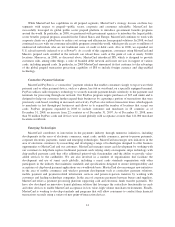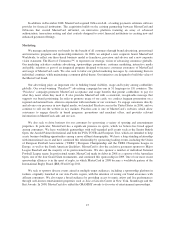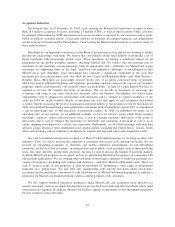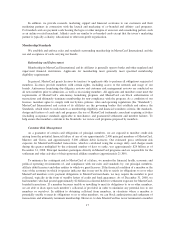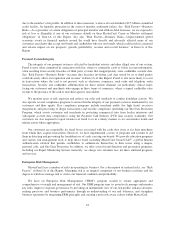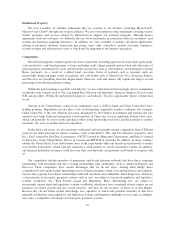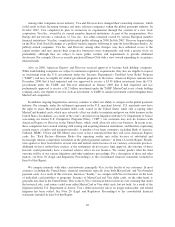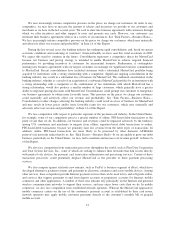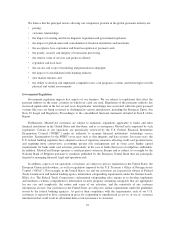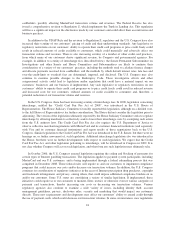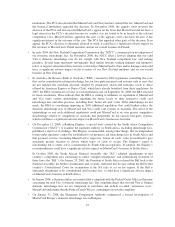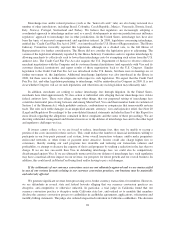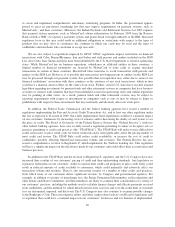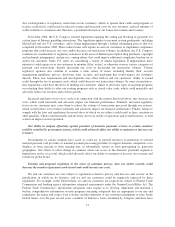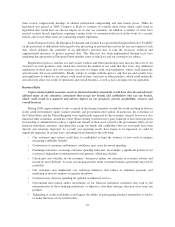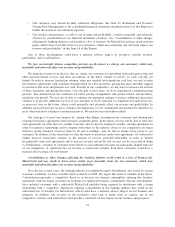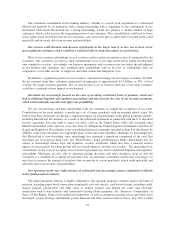MasterCard 2008 Annual Report Download - page 34
Download and view the complete annual report
Please find page 34 of the 2008 MasterCard annual report below. You can navigate through the pages in the report by either clicking on the pages listed below, or by using the keyword search tool below to find specific information within the annual report.cardholders, possibly affecting MasterCard transaction volume and revenues. The Federal Reserve has also
issued a comprehensive revision to Regulation Z, which implements the Truth in Lending Act. This regulation
will have a significant impact on the disclosures made by our customers and could affect their account terms and
business practices.
In addition to the UDAP Rule and the revision to Regulation Z, regulators and the U.S. Congress have also
increased their scrutiny of our customers’ pricing of credit and their underwriting standards. Any legislative or
regulatory restrictions on our customers’ ability to operate their credit card programs or price credit freely could
result in reduced amounts of credit available to consumers, which could materially and adversely affect our
transaction volume and revenues. There is also increasing scrutiny of a number of other credit card practices,
from which many of our customers derive significant revenue, by Congress and governmental agencies. For
example, in addition to scrutiny of interchange fees (described below), the Senate Permanent Subcommittee on
Investigations and other Senate and House Committees and Subcommittees are likely to continue their
consideration of a variety of our customers’ practices, including the methods used to calculate finance charges
and allocate payments received from cardholders, and the methods by which default interest rates, late fees and
over-the-credit-limit or overdraft fees are determined, imposed, and disclosed. The U.S. Congress may also
continue to examine possible changes to the Bankruptcy Code. These investigative efforts and other
congressional activity could lead to legislation and/or regulation that could have a material impact on our
customers’ businesses and our business if implemented. Any such legislative or regulatory restrictions on our
customers’ ability to operate their credit card programs or to price credit freely could result in reduced revenue
and increased costs for our customers, reduced amounts of credit available to consumers and, therefore, a
potential reduction of our transaction volume and revenues.
In the U.S. Congress, there has been increasing scrutiny of interchange fees. In 2008, legislation concerning
interchange, entitled the “Credit Card Fair Fee Act of 2008”, was introduced in the U.S. House of
Representatives. The House Judiciary Committee favorably reported this legislation, although on a divided vote,
to the full House of Representatives for further consideration. The House did not consider the legislation prior to
adjourning. The version of the legislation ultimately reported by the House Judiciary Committee seeks to regulate
interchange by allowing merchants to collectively seek to lower their interchange costs by exempting such action
from the U.S. antitrust laws. The Credit Card Fair Fee Act also requires the U.S. Department of Justice to
observe collective merchant negotiations with MasterCard and its customer financial institutions (and separately
with Visa and its customer financial institutions) and report results of those negotiations back to the U.S.
Congress. Similar legislation to the Credit Card Fair Fee Act was introduced in the U.S. Senate, but there were no
hearings on, or further movement of, such legislation. Additional interchange legislation also was introduced in
the House, but there were no further developments with respect to such legislation. We expect that the Credit
Card Fair Fee Act, and other legislation pertaining to interchange, will be introduced in Congress in 2009. It is
not clear whether Congress will act on such legislation, and what form any such legislation may ultimately take.
In October 2006, the U.S. Congress enacted legislation requiring the coding and blocking of payments for
certain types of Internet gambling transactions. The legislation applies to payment system participants, including
MasterCard and our U.S. customers, and is being implemented through a federal rulemaking process that was
completed in December 2008. These federal rules will require us and our customers to implement compliance
programs that could increase our costs and/or decrease our transaction volumes. In addition, the U.S. Congress
continues its consideration of regulatory initiatives in the areas of Internet prescription drug purchases, copyright
and trademark infringement, and privacy, among others, that could impose additional compliance burdens on us
and/or our customers. Some U.S. states are considering a variety of similar legislation. If implemented, these
initiatives could require us or our customers to monitor, filter, restrict, or otherwise oversee various categories of
payment card transactions, thereby increasing our costs or decreasing our transaction volumes. Various
regulatory agencies also continue to examine a wide variety of issues, including identity theft, account
management guidelines, privacy, disclosure rules, security and marketing that would impact our customers
directly. These new requirements and developments may affect our customers’ ability to extend credit through
the use of payment cards, which could decrease our transaction volumes. In some circumstances, new regulations
24


